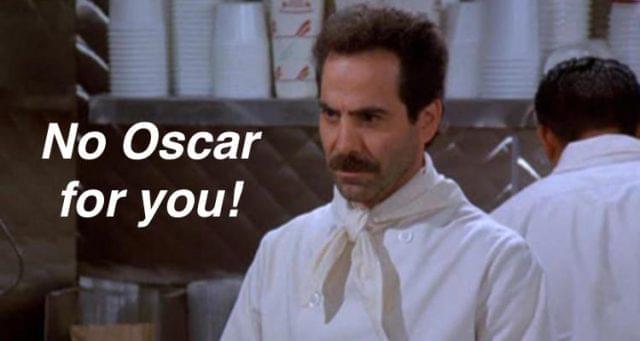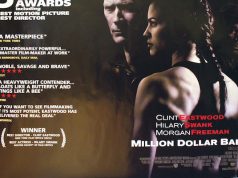
With the news that the musical score from “The Dark Knight” has been disqualified from Academy Awards consideration on the grounds that too many people were credited with composing it, outrage against the Academy’s stringent, complicated rules has erupted afresh. In the interest of fueling this indignation and making the world an angrier place, let’s take a belligerent march down memory lane and look at seven other controversial disqualifications. [Note: The Academy reversed its decision a few weeks later and the “Dark Knight” score was eligible after all, but it still didn’t got nominated.]
“The Jazz Singer” disqualified for being a talkie. When the very first Academy Awards were held in May 1929, honoring films released between August 1927 and July 1928, everyone was talking about “The Jazz Singer” — the first feature-length movie to use recorded sound in some of its talking and singing scenes. So great was the attention that the Academy disqualified the film from the inaugural Best Picture category, reasoning that its use of sound put it on an uneven playing field against the films still stuck in silence. Instead, the Academy gave Warner Bros. a special award “for producing ‘The Jazz Singer,’ the pioneer outstanding talking picture, which has revolutionized the industry.” It’s true, too! I don’t know if you’ve noticed, but pretty much all movies nowadays have talking in them.
“Young Americans” disqualified from Best Documentary category … after it already won. Whoops. This is a sad case, and a unique one. The documentary, about the peppy Young Americans show choir, won the Oscar at the 1969 ceremony for being the best feature-length documentary of 1968. But a few weeks later, the Academy discovered that the film had screened at a theater in October 1967, making it eligible for that year’s awards and not for 1968. The Academy actually took back the Oscar statues from the filmmakers, Alex Grasshoff and Robert Cohn, and gave the award to the film that had been first runner-up. When Grasshoff died earlier this year, his widow told the Los Angeles Times how heartbroken he’d been. Can you imagine?
Musical score from “The Godfather” disqualified because some of it was from an earlier score. Nina Rota’s haunting score from “The Godfather” actually got as far as being nominated for an Oscar before someone discovered that its love theme had been previously used in another film Nona had scored, “Fortunella.” The rules say the music must be written specifically for the movie at hand, so Nona was disqualified and the score from “Sleuth” was added as a nominee in its place. Two years later, Rota was co-nominated with Carmine Coppola for their “Godfather Part II” score, and actually won. How could that be, though, when much of the music was simply reused from the first “Godfather”? Because the Academy had changed the rules in the meantime. Arrgh!
“Come What May” from “Moulin Rouge” disqualified because it was actually written for a previous project. This is the one that irks me, personally, the most, since the song is gorgeous and actually fit the story of the film. But to be eligible for the Best Song category, the song must have been written specifically for the movie. (That’s why screen versions of Broadway musicals usually toss in a couple of new, just-for-the-movie tunes — because the preexisting songs can’t win Oscars.) “Come What May,” as it turns out, had been written for “Moulin Rouge” director Baz Luhrmann’s “Romeo + Juliet.” He wound up not using it, but it didn’t matter. The fact that it hadn’t been written with “Moulin Rouge in mind” made it ineligible. I always wondered why “Come What May” songwriter David Baerwald didn’t just, you know, lie about it. I mean, who would have known that he’d actually written it for something else? Apparently he’s a more honest person than I am. Oh, and as usual, the Best Song winner that year was something that played over the closing credits and had nothing to do with the movie. Happy, Academy?
“Fahrenheit 9/11” disqualified because it aired on TV too soon. The Academy gets a break on this one — it was Michael Moore’s own damn fault. The rules said that to be eligible, a documentary cannot air on television any sooner than nine months after its theatrical debut. “Fahrenheit 9/11” was released in the summer of 2004, and Moore chose to show it on pay-per-view TV on Nov. 1, hoping it would influence the election in John Kerry’s favor over George W. Bush. He knew it would disqualify him from the documentary category, though he hoped it might still get a Best Picture nomination. (The eligibility rules are different in that category.) Well, as it turns out, the film didn’t get nominated for anything, and Bush still won the election. Nice try, though, Mike.
“The Band’s Visit” disqualified from the Best Foreign Language Film category for having too much English. In the foreign-language category, the rules are pretty simple. The film must be predominantly in a language other than English, and it must come from a country other than the United States. “The Band’s Visit,” an optimistic, can’t-we-all-get-along? comedy from Israel in 2007, seemed like a shoo-in for a nomination, and many considered it a good bet for the win. The problem was this: The movie is about an Egyptian police band getting lost in a small Israeli town. The characters don’t speak each other’s languages, so they communicate in the smattering of English that they do have in common. It makes sense, and it enhances the film’s overall theme of learning to understand and communicate with one another. Doesn’t matter, the Academy said. Since the English spoken in the film adds up to more than 51% of the dialogue — and yes, people from the Academy sat there with stopwatches — it didn’t qualify as a “foreign-language” film.
Jonny Greenwood’s “There Will Be Blood” score disqualified for not being original enough. It would seem that the music categories are the ones that cause the most trouble, and this sting from last year is still fresh in a lot of people’s minds, especially fans of the Radiohead guitarist Greenwood. The Academy ruled that his haunting, unusual score for “There Will Be Blood” was ineligible because it was “diluted by the use of tracked themes or other pre-existing music.” Greenwood wrote about 35 minutes of original material, used about 15 minutes of some of his own previously written music, and incorporated music by the likes of Arvo Pärt and Johannes Brahms. Whatever the combo was, the Academy nixed it — but not before the preliminary ballots had already gone out with the score listed as being eligible. Still, at least they made up their minds before the thing actually got nominated — or, heaven forbid, before Greenwood actually went home with the trophy. One take-back in an 80-year history is enough.
— Cinematical




